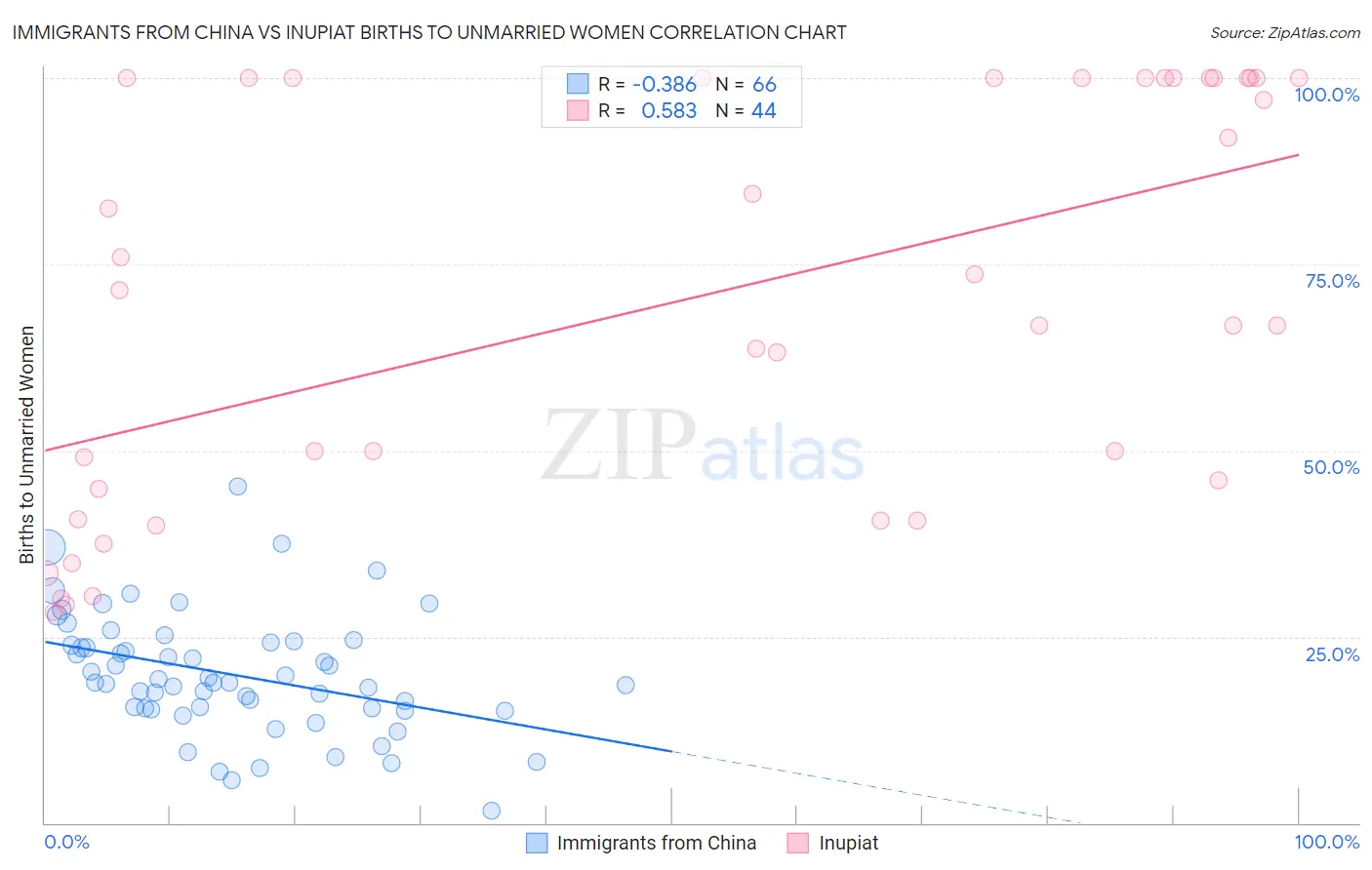Immigrants from China vs Inupiat Births to Unmarried Women
COMPARE
Immigrants from China
Inupiat
Births to Unmarried Women
Births to Unmarried Women Comparison
Immigrants from China
Inupiat
24.7%
BIRTHS TO UNMARRIED WOMEN
100.0/ 100
METRIC RATING
8th/ 347
METRIC RANK
52.1%
BIRTHS TO UNMARRIED WOMEN
0.0/ 100
METRIC RATING
345th/ 347
METRIC RANK
Immigrants from China vs Inupiat Births to Unmarried Women Correlation Chart
The statistical analysis conducted on geographies consisting of 420,563,672 people shows a mild negative correlation between the proportion of Immigrants from China and percentage of births to unmarried women in the United States with a correlation coefficient (R) of -0.386 and weighted average of 24.7%. Similarly, the statistical analysis conducted on geographies consisting of 94,892,154 people shows a substantial positive correlation between the proportion of Inupiat and percentage of births to unmarried women in the United States with a correlation coefficient (R) of 0.583 and weighted average of 52.1%, a difference of 111.1%.

Births to Unmarried Women Correlation Summary
| Measurement | Immigrants from China | Inupiat |
| Minimum | 1.6% | 28.3% |
| Maximum | 45.2% | 100.0% |
| Range | 43.6% | 71.7% |
| Mean | 19.9% | 70.0% |
| Median | 18.9% | 69.1% |
| Interquartile 25% (IQ1) | 15.3% | 42.8% |
| Interquartile 75% (IQ3) | 24.2% | 100.0% |
| Interquartile Range (IQR) | 8.9% | 57.2% |
| Standard Deviation (Sample) | 8.1% | 27.2% |
| Standard Deviation (Population) | 8.0% | 26.9% |
Similar Demographics by Births to Unmarried Women
Demographics Similar to Immigrants from China by Births to Unmarried Women
In terms of births to unmarried women, the demographic groups most similar to Immigrants from China are Immigrants from South Central Asia (24.7%, a difference of 0.010%), Immigrants from Eastern Asia (25.0%, a difference of 1.5%), Immigrants from Israel (25.1%, a difference of 1.9%), Indian (Asian) (25.3%, a difference of 2.4%), and Iranian (25.3%, a difference of 2.5%).
| Demographics | Rating | Rank | Births to Unmarried Women |
| Assyrians/Chaldeans/Syriacs | 100.0 /100 | #1 | Exceptional 22.0% |
| Immigrants | India | 100.0 /100 | #2 | Exceptional 22.9% |
| Filipinos | 100.0 /100 | #3 | Exceptional 23.0% |
| Immigrants | Taiwan | 100.0 /100 | #4 | Exceptional 23.0% |
| Immigrants | Hong Kong | 100.0 /100 | #5 | Exceptional 23.6% |
| Immigrants | Iran | 100.0 /100 | #6 | Exceptional 24.0% |
| Thais | 100.0 /100 | #7 | Exceptional 24.0% |
| Immigrants | China | 100.0 /100 | #8 | Exceptional 24.7% |
| Immigrants | South Central Asia | 100.0 /100 | #9 | Exceptional 24.7% |
| Immigrants | Eastern Asia | 100.0 /100 | #10 | Exceptional 25.0% |
| Immigrants | Israel | 100.0 /100 | #11 | Exceptional 25.1% |
| Indians (Asian) | 100.0 /100 | #12 | Exceptional 25.3% |
| Iranians | 100.0 /100 | #13 | Exceptional 25.3% |
| Immigrants | Lebanon | 100.0 /100 | #14 | Exceptional 25.3% |
| Immigrants | Singapore | 100.0 /100 | #15 | Exceptional 25.6% |
Demographics Similar to Inupiat by Births to Unmarried Women
In terms of births to unmarried women, the demographic groups most similar to Inupiat are Navajo (51.5%, a difference of 1.2%), Pima (51.5%, a difference of 1.2%), Menominee (51.1%, a difference of 1.9%), Hopi (50.8%, a difference of 2.5%), and Pueblo (53.7%, a difference of 3.0%).
| Demographics | Rating | Rank | Births to Unmarried Women |
| Blacks/African Americans | 0.0 /100 | #333 | Tragic 44.3% |
| Yuman | 0.0 /100 | #334 | Tragic 44.4% |
| Colville | 0.0 /100 | #335 | Tragic 45.3% |
| Puerto Ricans | 0.0 /100 | #336 | Tragic 45.7% |
| Houma | 0.0 /100 | #337 | Tragic 46.6% |
| Arapaho | 0.0 /100 | #338 | Tragic 47.1% |
| Lumbee | 0.0 /100 | #339 | Tragic 48.2% |
| Tohono O'odham | 0.0 /100 | #340 | Tragic 49.8% |
| Hopi | 0.0 /100 | #341 | Tragic 50.8% |
| Menominee | 0.0 /100 | #342 | Tragic 51.1% |
| Pima | 0.0 /100 | #343 | Tragic 51.5% |
| Navajo | 0.0 /100 | #344 | Tragic 51.5% |
| Inupiat | 0.0 /100 | #345 | Tragic 52.1% |
| Pueblo | 0.0 /100 | #346 | Tragic 53.7% |
| Yup'ik | 0.0 /100 | #347 | Tragic 56.4% |